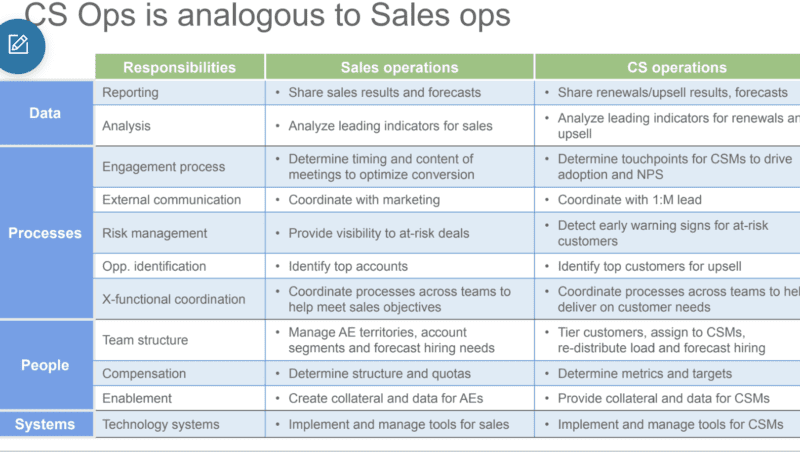So, you want to be a CS Ops Professional? Well, have you been paying attention to the job market? If so, you may have seen the recent uptick in interest and advertisement for positions as a Customer Success Operations Manager or Administrator. But you may have also noticed a lack of clarity and standardization of hiring requirements, guidelines, and experience. As a result, details often overlap and can seem confusing.
For example, some companies ask for seven years of experience in CS operations in a field less than ten years old. Others may want education beyond a Bachelor’s degree, but universities currently offer no Major in CS. Businesses are looking for a particular background in analytics or technology, which is understandable. But the person applying for the position must comprehend that customer success is still very much about relationships, knowing the customer’s needs, and achieving outcomes with a human-first approach.
The truth is, right now, customer success is a new and evolving industry. What was needed two to four years ago may now be considered outdated within the industry? Perhaps there are more desired attributes, such as previous experience with CRM systems. However, it seems like there is a current emphasis on what seems impractical, if not impossible. We at Gainsight have discovered that there is no one path to most positions in CS.
While every company is different with varied needs, Gainsight is always working towards industry standardization. Yet, standardized requirements don’t always produce the best candidates. We have seen teachers that become excellent Customer Success Managers. People in finance become Product leaders. There are even Chief Customer Officers that made their way into the CEO chair. We have learned to keep an open mind. The central theme or core competency is knowledge mastery, problem-solving ability, and relationship building.
Systems and Data
The first requirement in most CS Ops positions is to establish a systemized way to capture your customer’s data. If you are a Small to Medium Business (SMB) with under 50 employees, your CS system may be in a spreadsheet format or a Google doc shared in a common drive accessed by customer-facing employees. If you are an enterprise company, you may already have a CS platform that aggregates data to reveal information on your customers. The important thing is that whatever system you have is a central source of truth that everyone in the organization or company can utilize. As a CS Ops leader, your role will be understanding and organizing the revealed data.
The next step is to use the data produced by the system to tell a story not only about your customers, but also about your product and your company. You will need to communicate past results, renewals, and upsell forecasts to executives above you and perhaps even the board of directors. Presentations must be consumable and easily understood. That means your tools will be your CS platform dashboards tailored for this use and other presentation tools, such as Microsoft’s PowerPoint, Apple’s Keynote, or Google’s Slides.
For any CS Ops professional there must be an absolute understanding of the Customer Lifecycle. As a CS Ops manager or administrator, you will have to be informed to recommend and determine the timing and content of touchpoints for CSMs along the customer journey. For example, when is the proper time or cadence to inject into the Customer Journey to drive optimal adoption and engagement? Dashboard information that reports on login and use are good indicators of adoption and use. But do not forget sentiment surveys, such as Net Promoter Scores (NPS). These surveys, again, are the data that reveals how your processes are performing and developing the outcomes for your customers.
Reporting the findings of the system is core to your Data analysis. It is a large part of the CS Ops job to track leading indicators of renewals and upsells for opportunity management. You need to understand what is going on in your customer base according to past predictors and current trends. There is also recognizing what is revealed not only through data analysis but also relationship perception. Can you tell when a green customer is about to churn? This knowledge leads to risk management. You must have an eye to detect the signals for at-risk renewals and customers early on. This is sometimes called operational rigor. There has to be a designed playbook for CSMs to address these issues and provide a path to mitigate escalations for each incident.
It can be a definite asset if you have a background in data management systems, data analysis, or a degree in operations management. It is a necessity to implement and manage the software that facilitates CSM Ops activities. Experience with such software and platforms will enhance your ability to perform in a CS Ops role.
Communication
Communication is essential for this role as you will need to uncover the priorities and preferences of leaders across functions and up and down the hierarchy, and then gather insights to inform them. The ability to distill data and make process recommendations will test the communication skills of even the most eloquent leaders.
While your CS leaders are your most important stakeholders, you’ll want to establish strong rapport with your onboarding team in short order. The clock is always ticking on implementation and onboarding, so keep a close eye on this process and how the customer and the team work together. As a CS Ops leader, it is a huge responsibility to get the customer to use the product and see results quickly, and your goal should always be to drive shorter Time to Value (TTV).
Support is also a part of the communication loop. Aligning with the Support team guides the resolution of major cases that keep customers satisfied. You also can report bugs to the Engineering team that may prove a more significant impediment in the future.
Feedback is a form of communication. Any customer data that can be delivered to the Product team aids in improving the product, which in turn creates a better customer experience and engagement. Without these, there is little chance for the end-user to adopt the product thoroughly.
Believe it or not, Sales is very much a partner in the communication path. Your role in CS Ops will help elevate opportunities for renewal as well as upsell targets. You can only accomplish this motion by delivering on customer expectations and needs. The ability to answer questions is a must, and those answers need to be shared with every customer-facing employee, especially your CSMs. Aligning with Sales on these motions will help close the deal. In fact, transitioning from Sales operations into CS ops is not that difficult because Sales Ops is analogous to CS ops.

With regards to external communications, as a CS Ops professional, you will have to coordinate 1:Many information delivery. As the communications lead within the CSM team and organization, you will need to synchronize email outreaches with CSM touchpoints as well as any customer marketing campaigns. If you are not aware of other teams’ email cadences, you could unnecessarily “spam” your customers with excessive contact. This will put pressure on the entire organization that all communication has value to your customers.
The Asset of Listening
One last valuable attribute that should be addressed is the ability to listen and learn. As a CS Ops professional, you must be permanently poised to listen and learn from your customers and team. That includes reading people in every situation. You must be able to understand them through a compassionate perspective and act accordingly on the insight provided, even when you don’t have direct contact with customers.
Yes, most definitions of compassion center on the word “intuitive” and how it leads you to a deeper understanding of a person, a thing, or a situation. In this situation, CS Ops managers and administrators have to approach their work with an even greater focus and consideration to the real people at the other end of their processes and automations.
Learn from your intuitive sense and all other inputs to help the customer, team, organization, and company every chance you can. Yes, that includes dashboards and Health Scores. It also consists of conversations, gut feelings, and even a tone of voice. Listening is a tool that should be included in every CS professional’s toolbox to perform their job thoroughly. Having a previous or current role in management helps in the position of CS Ops, especially management in an enterprise company that requires cross-collaboration. Having a current customer-facing job or history in customer support is a plus. Remember, the essential part of the role of Customer Success operations is the “customer.”
Leadership
A CS Ops leader not only establishes team structure but also helps create a tier system for existing customers with a CS leader. The CS team structure has a lasting impact on your customer base. Sometimes, CSMs do not possess the skills or personality traits to be assigned to a particular segment. A CS Ops manager must know the CS team well enough to help manage account assignments, workload balancing, and headcount forecasts when there is impending growth and scale.
The CS Ops manager can offer data to the CS leader that helps determine compensation and the metrics on which bonuses are based. When defining targets for those metrics, the CS Ops lead must ensure that those goals are measurable and attainable. Also, they must enable their CSMs by providing them with all the tools, resources, materials, and data to help them become more effective in everything they do.
Your leadership will come from the individual you report to, most likely the VP or Director of Customer Success. As the CS Ops leader, you will be a trusted partner in defining customer success objectives, strategy, and tactics and then implementing those processes that scale. If you have a background in project or product management, it will aid in this role.
Characteristics of a True CS Ops Professional
Passion is a critical word in the description of a CS Ops Professional. First, passion for being in the trenches. They must be willing to roll up their sleeves, dig into complex operations, and “get their hands dirty.” If you aren’t ready to do that, then this may not be the job for you. You also must have a passion for designing processes that scale. But to create operational strategies and processes, you need to break down ambiguous problems into concrete, manageable components to identify optimal solutions.
This type of leadership definitely stands out from the pack. But it is leadership not through demand but influence. It takes a high degree of ownership over your work and the work your team creates. While having a professional presence is a given, the second part is being a transparent and commanding communicator. You need strong listening skills and openness to input from other team members and departments. That is why many companies lean towards existing CSMs to transition into the role of CS Ops. CSMs already have many of the qualities and skills to progress to the next level in their current position.
A Customer Success Operations Professional’s whole mission is to drive the effectiveness and efficiency of your Customer Success team. With that understanding, sometimes, the best CS Ops leaders come straight from a CS team. But if you believe that your place is in CS Operations, don’t stop. There is no one path to a customer success position. As stated before, there are examples of former teachers, nurses and health care techs, and people with sales and customer service backgrounds finding a path into CS. Who knows? The next CS Ops manager may be you.
Gainsight offers a ton of valuable information for those looking to get started or level up their CS Ops knowledge. A great place to start is here to learn more about the role and connect with like-minded professionals. We want to hear from you! Have more insights about what you’d like to know about CS ops or have an interest in making the switch, email us here.

